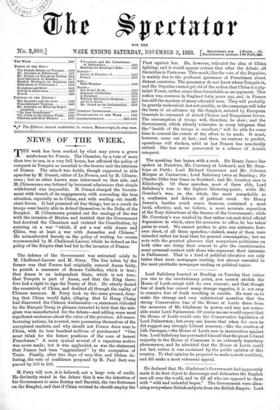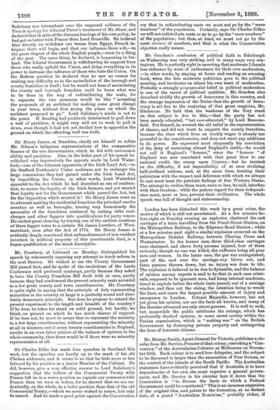He declared that Mr. Gladstone's Government had apparently made it
its first object to discourage and dishearten the English race all over the world, and to fill all who are opposed to them with "wild and unlawful hopes." The Government were alien- ating everywhere British subjects from the British Empire. Lord Salisbury was triumphant over the supposed coldness of the French apology for Admiral Pierre's treatment of Mr. Shaw, and declared that in spite of the German leanings of his own policy, he had got on better with France than Lord Granville. He believed that directly we withdraw oar troops from Egypt, French in• trignes there will begin, and that our influence there wfl1,—to the great disgust of the whole English people,—soon be a thing of the past. The same thing, he declared, is happening in Ire- land. The Liberal Government is withdrawing its support from those who really uphold the Union, and doing everything in its power to increase the influence of those who hate the Union. On the Reform question he declared that he saw no reason for making any difficulty as to the assimilation of the borough and county franchise in itself; but he would not hear of assimilating the county and borough franchise until he knew what was to be done in the way of redistributing the seats, for to separate the two measures would be like " accepting the proposals of an architect for making some great change in your town, without first seeing the plans on which the architect proposed to go." Lord Salisbury's simile is not to the point. If .Reading had positively determined to pull down a wall of partition, it might very well set to work to pull it down, even though it had not yet decided how to apportion the ground on which the offending wall was built.







































